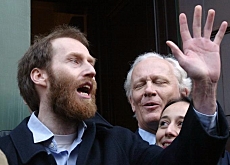
Charity faces showdown in Geneva court

The Dutch government is taking the Swiss branch of Médecins Sans Frontières (MSF) to court over the payment of a €1 million (SFr1.55 million) ransom.
The money was paid last year to secure the release of the Dutch head of an MSF-Switzerland mission to Dagestan.
Arjan Erkel was taken hostage in Makhachkala, capital of the autonomous Russian republic, in 2002.
He was freed after 20 months in captivity when the Dutch government paid a ransom to secure his release.
The country’s foreign ministry maintains the payment was made in the form of a loan which would eventually be repaid.
But the director-general of MSF-Switzerland, Christian Captier, disagrees.
“As far as we are concerned, there never was a loan from the Dutch,” he told swissinfo.
“They presented it to us as a fait accompli since they handled all the negotiations for Arjan Erkel’s liberation.”
Captier claims that his charity never gave the Dutch government a mandate to act on its behalf.
It will now be up to a court in Geneva to decide whether MSF-Switzerland should be forced to pay up.
Principles
The charity originally offered to share the cost of the ransom, but this proposal was rejected by the Dutch government and MSF’s head office.
Captier is now standing firm and says the dispute has become a matter of principle.
“Money is not the question here,” he said. “We mobilised 15 people while Arjan was held hostage and we spent far more than what the ransom is said to have cost.
“What is unacceptable in this case is that a democratic government whose own policy is not to pay ransoms is attacking a non-governmental organisation to save face.”
Captier believes the Dutch should not have pushed the case as far as the courts and points out that they have chosen the wrong target.
“We are concerned that they are attacking us rather than demanding why the kidnappers have still not been arrested by the Russian authorities.”
The Dutch foreign ministry, which did not respond to a request for an interview, maintains that the NGO is responsible for its staff and has warned its citizens of the risks involved in travelling in the region concerned.
Pressure
Captier believes the case being brought against MSF is likely to put pressure on other NGOs active in trouble spots around the world.
“What worries us is that we will only be discussing money in court rather than the fact that governments should be protecting [their] populations, and aid workers,” he said.
He points to MSF’s decision to pull out of Iraq and Afghanistan as proof that aid agencies and charities are becoming increasingly concerned about not receiving support back home when their staff are caught up in conflict abroad.
“It is becoming more and more difficult for NGOs to work impartially and independently in some areas.
“The fact is that some states, including democracies, are prepared to forego humanitarian principles.”
swissinfo, Scott Capper
Arjan Erkel, head of MSF’s mission in Dagestan, was kidnapped on August 12, 2002.
He spent 607 days in captivity before being freed on April 11, 2004.
During his detention, MSF programmes in the area were put on hold.

In compliance with the JTI standards
More: SWI swissinfo.ch certified by the Journalism Trust Initiative






























You can find an overview of ongoing debates with our journalists here . Please join us!
If you want to start a conversation about a topic raised in this article or want to report factual errors, email us at english@swissinfo.ch.